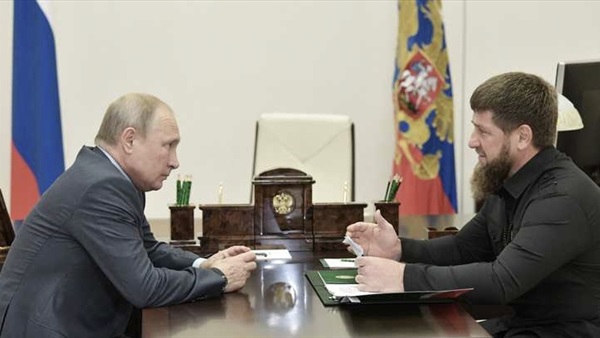We must go nuclear in Ukraine, Chechen warlord tells Putin

President Putin faces mounting pressure from Russian hardliners after his latest military setback, with the Chechen leader Ramzan Kadyrov calling for the use of “low-yield” nuclear weapons.
Ukraine recaptured the strategic town of Lyman in the Donetsk area on Saturday, a day after Putin announced the annexation of the region and three others in a choreographed ceremony at the Kremlin. About 5,000 Russian soldiers were tasked with holding the town, hundreds of whom are believed to have been killed or captured as they fled.
“In my personal opinion, more drastic measures should be taken, up to the declaration of martial law in the border areas and use of low-yield nuclear weapons,” Kadyrov, 45, wrote on the Telegram messaging app. He also announced that he would be sending three of his teenage sons — aged 14, 15 and 16 — to the Ukrainian front.
On Monday, the Kremlin said it favoured a “balanced approach” to the issue of nuclear weapons.
Spokesman Dmitry Peskov said: “This is a very emotional moment. The heads of regions have the right to express their point of view.”
“But even in difficult moments, emotions should be kept out of any kind of assessment. So we prefer to stick to balanced, objective assessments,” he added.
Peskov also said that the Kremlin would need to carry out consultations on defining the borders of two of the territories, Kherson and Zaporizhzhia, although he did not specify what this would involve.
A close Putin ally, Kadyrov has been one of the most vocal backers of the invasion but has increasingly criticised its handling amid Ukraine’s counteroffensive and a series of humiliating defeats for Russia.
On Saturday he claimed that the military leadership had covered for the “mediocre” Colonel-General Alexander Lapin, commander of Russia’s forces in Lyman. Kadyrov said he should be “sent to the front to wash off his shame with blood”.
Yevgeny Prigozhin, the oligarch behind the Russian Wagner mercenary group, endorsed Kadyrov’s comments. “Send all these thugs barefoot with machineguns straight to the front,” he wrote in a statement published by his company Concord.
Lyman is strategically important because of a crossing over the Siversky Donestk river. The British Ministry of Defence said Russia had been trying to consolidate its forces on the other side of the crossing and that it “probably experienced heavy casualties”.
Ukrainian forces are now pushing on to Kreminna, on the northwestern flank of the city of Severodonetsk, taken by Russia in June at great cost after a ferocious two-month battle.
Russian pro-war bloggers, who broadcast their views to hundreds of thousands of followers, also decried Moscow’s retreat from Lyman. Rybar, an anonymous channel with almost a million followers, wrote: “One thing does not suit everyone: the cumulative effect of the local command delivering reports of ‘successes’ to their superiors for many years. This has now resulted in another failure at the front.”
In the south, Ukraine’s forces appeared to be making headway on Sunday, driving down the west bank of the Dnipro towards Kherson. Rybar said that Kremlin forces had lost a further three settlements there.
Boris Rozhin, another blogger, said the situation had “deteriorated” in the Nikopol area. “The enemy is attacking southwards towards Beryslav via Zolota Balka. The situation may very soon become critical,” he wrote.
Andrei Gurulev, a Russian MP, asked what had happened to 1.5 million winter uniforms allocated for troops. “We must get answers to these key questions,” he wrote on Telegram. “We will look at the commander-in-chief of the ground forces responsible for this.”
Zakhar Pripelin, a novelist and former ultra-conservative MP, called on the Kremlin to throw its weight behind an accelerated war effort. He said: “In a month I would like, in the best sense, not to know my country. Because only a new country will deliver new victories at the front,” he wrote. “We saw peacetime economics, culture, governors and even peacetime generals. The new country should have no limits and no peacetime. Acceleration, impulse and mobilisation at all levels.”
The loss of Lyman is the latest strategic failure for Moscow’s forces in its seven-month war. Putin sought to turn the tide by ordering a “partial” mobilisation of reservists last month, but that has led to hundreds of thousands of fighting-age men rushing to flee the country.
Some men detained for protesting against the mobilisation have said they were handed draft papers or even taken to enlistment offices straight from their cells.
The official website of the education ministry of Dagestan, where there have been large protests against the mobilisiation, published President Zelensky’s speech calling on the region not to fight for Russia in Ukraine, although the post has since been taken down.
The poet Boris Bulgakov, who was detained for reciting an anti-war message, was taken directly to an enlistment office as he left a detention centre on Saturday. He told the independent Mediazona news website: “The military commissar, in the presence of a police officer and two witnesses, specified that if I did not appear [for military registration], I would face a criminal case, a prison term and sexual abuse from ‘patriotic’ prisoners.”
Kyiv has called for the immediate release of the chief of the Moscow-held Zaporizhzhya nuclear power plant, condemning his “illegal detention” by the Russians.
Ihor Murashov was leaving the plant on Friday when he was detained and “driven in an unknown direction” while blindfolded, Ukraine’s nuclear agency Energoatom has said.
In a statement from the International Atomic Energy Agency (IAEA), its chief Rafael Grossi said Murashov’s detention was cause for “grave concern”.
Grossi is expected to travel to Kyiv and Moscow “next week”, the UN agency added.





